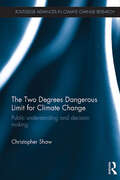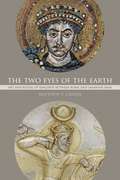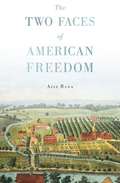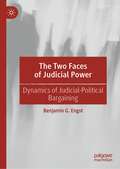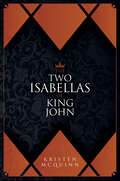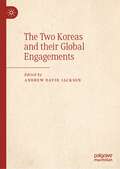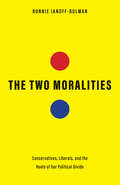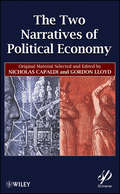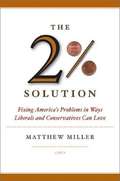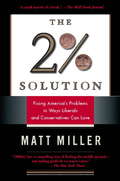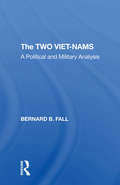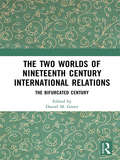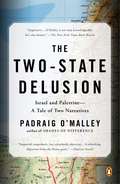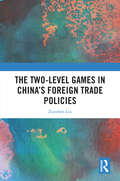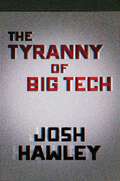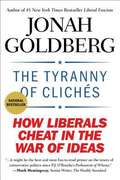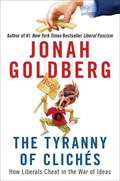- Table View
- List View
The Two Degrees Dangerous Limit for Climate Change: Public Understanding and Decision Making (Routledge Advances in Climate Change Research)
by Christopher ShawThis book is about the history, present and future of one the most important policy ideas of the modern era – that there is a single, global dangerous amount of climate change. That dangerous amount of climate change is imagined as two degrees centigrade of global warming above the pre-industrial average. Though the two degree idea is based on the value system of elite policy actors, it is been constructed in public discourses as scientific fact. This false representation of the concept undermines opportunities for positive public engagement with the climate policy debate, yet it is strong public engagement which is a recurring aspiration of climate policy discourses and is considered essential if climate mitigation strategies are to work. Alongside a critical analysis of how the idea of a single dangerous limit has shaped our understanding of what sort of problem climate change is, the book explains how the public have been kept out of that decision making process, the implications of this marginalisation for climate policy and why the dangerous limit idea is undermining our ability to mitigate climate change. The book concludes by exploring possibilities for a deliberation about the future of the two degree limit which allows for public participation in the decision making process. This book illustrates why, at this critical juncture in the climate policy debate, the two degree limit idea has failed to achieve any of the policy goals intended. This is the first book dedicated to questioning the issue of the two degree limit within a social science framework and should be of interest to students and scholars of environmental policy and politics, climate change communication, and science, technology and society studies.
The Two Eleanors of Henry III: The Lives of Eleanor of Provence and Eleanor de Montfort
by Darren BakerThis account of two strong medieval women and their relationship &“thoroughly engrosses you in a story hundreds of years past&”(Seattle Book Review). Born in 1223, Eleanor of Provence has come to England at the age of twelve to marry the king, Henry III. He&’s sixteen years older, but was a boy when he ascended the throne. He&’s a kind, sensitive sort whose only personal attachments to women so far have been to his three sisters. The youngest of those sisters is called Eleanor too. She was only nine when, for political reasons, her first marriage took place, but she&’s already a chaste twenty-year-old widow when the new queen arrives in 1236. Soon, this Eleanor will marry the rising star of her brother&’s court, a French parvenu named Simon de Montfort, thus wedding the fates of these four people together in an England about to undergo some of the most profound changes in its history. The Two Eleanors of Henry III is a tale that spans decades, with loyalty to family and principles at stake, in a land where foreigners are subject to intense scrutiny and jealousy. The relationship between these two sisters-in-law, close but ultimately doomed, reflects not just the turbulence and tragedy of their times, but also the brilliance and splendor.
The Two Eleanors of Henry III: The Lives of Eleanor of Provence and Eleanor de Montfort
by Darren BakerThis account of two strong medieval women and their relationship &“thoroughly engrosses you in a story hundreds of years past&”(Seattle Book Review). Born in 1223, Eleanor of Provence has come to England at the age of twelve to marry the king, Henry III. He&’s sixteen years older, but was a boy when he ascended the throne. He&’s a kind, sensitive sort whose only personal attachments to women so far have been to his three sisters. The youngest of those sisters is called Eleanor too. She was only nine when, for political reasons, her first marriage took place, but she&’s already a chaste twenty-year-old widow when the new queen arrives in 1236. Soon, this Eleanor will marry the rising star of her brother&’s court, a French parvenu named Simon de Montfort, thus wedding the fates of these four people together in an England about to undergo some of the most profound changes in its history. The Two Eleanors of Henry III is a tale that spans decades, with loyalty to family and principles at stake, in a land where foreigners are subject to intense scrutiny and jealousy. The relationship between these two sisters-in-law, close but ultimately doomed, reflects not just the turbulence and tragedy of their times, but also the brilliance and splendor.
The Two Eyes of the Earth: Art and Ritual of Kingship between Rome and Sasanian Iran
by Matthew P. CanepaThis pioneering study examines a pivotal period in the history of Europe and the Near East and investigates the shared ideal of sacred kingship that emerged in the late Roman and Persian empires and explores the artistic, ritual, and ideological interactions between Rome and the Iranian world under the Sasanian dynasty.
The Two Faces of American Freedom
by Aziz RanaThe Two Faces of American Freedom reinterprets the American political tradition from the colonial period to modern times, placing issues of race relations, immigration, and presidentialism in the context of shifting notions of empire and citizenship. Rana envisions a democratic society that revives settler ideals, but combines them with meaningful inclusion for those currently at the margins of American life.
The Two Faces of American Freedom
by Aziz RanaThe Two Faces of American Freedom boldly reinterprets the American political tradition from the colonial period to modern times, placing issues of race relations, immigration, and presidentialism in the context of shifting notions of empire and citizenship. Today, while the U.S. enjoys tremendous military and economic power, citizens are increasingly insulated from everyday decision-making. This was not always the case. America, Aziz Rana argues, began as a settler society grounded in an ideal of freedom as the exercise of continuous self-rule—one that joined direct political participation with economic independence. However, this vision of freedom was politically bound to the subordination of marginalized groups, especially slaves, Native Americans, and women. These practices of liberty and exclusion were not separate currents, but rather two sides of the same coin. However, at crucial moments, social movements sought to imagine freedom without either subordination or empire. By the mid-twentieth century, these efforts failed, resulting in the rise of hierarchical state and corporate institutions. This new framework presented national and economic security as society’s guiding commitments and nurtured a continual extension of America’s global reach. Rana envisions a democratic society that revives settler ideals, but combines them with meaningful inclusion for those currently at the margins of American life.
The Two Faces of Judicial Power: Dynamics of Judicial-Political Bargaining
by Benjamin G. EngstThis book shows that constitutional courts exercise direct and indirect power on political branches through decision-making. The first face of judicial power is characterized by courts directing political actors to implement judicial decisions in specific ways. The second face leads political actors to anticipate judicial review and draft policies accordingly. The judicial–political interaction originating from both faces is herein formally modeled. A cross-European comparison of pre-conditions of judicial power shows that the German Federal Constitutional Court is a well-suited representative case for a quantitative assessment of judicial power. Multinomial logistic regressions show that the court uses directives when evasion of decisions is costly while accounting for the government’s ability to implement decisions. Causal analyses of the second face of judicial power show that bills exposed to legal signals are drafted accounting for the court. These findings re-shape our understanding of judicialization and shed light on a silent form of judicialization.
The Two Hendricks: Unraveling a Mohawk Mystery
by Eric HinderakerIn September 1755, the most famous Indian in the world—a Mohawk leader known in English as King Hendrick—died in the Battle of Lake George. He was fighting the French in defense of British claims to North America, and his death marked the end of an era in Anglo-Iroquois relations. He was not the first Mohawk of that name to attract international attention. Half a century earlier, another Hendrick worked with powerful leaders in the frontier town of Albany. He cemented his transatlantic fame when he traveled to London as one of the “four Indian kings.”Until recently the two Hendricks were thought to be the same person. Eric Hinderaker sets the record straight, reconstructing the lives of these two men in a compelling narrative that reveals the complexities of the Anglo-Iroquois alliance, a cornerstone of Britain’s imperial vision. The two Hendricks became famous because, as Mohawks, they were members of the Iroquois confederacy and colonial leaders believed the Iroquois held the balance of power in the Northeast. As warriors, the two Hendricks aided Britain against the French; as Christians, they adopted the trappings of civility; as sachems, they stressed cooperation rather than bloody confrontation with New York and Great Britain.Yet the alliance was never more than a mixed blessing for the two Hendricks and the Iroquois. Hinderaker offers a poignant personal story that restores the lost individuality of the two Hendricks while illuminating the tumultuous imperial struggle for North America.
The Two Isabellas of King John
by Kristen McQuinnKing John of England was married to two women: Isabella of Gloucester and Isabelle of Angoulême. The two women were central to shaping John and his reign, each in her own way molding the king and each other over their lives. Little is known about Isabella of Gloucester and she has largely become an historical footnote; Isabelle of Angoulême has a reputation as a witch and poisoner. However, both were products of their time, victims and pawns of the powerful men whose voices overwrote the experiences of women. By examining these two very different women through a modern feminist lens, The Two Isabellas offers new insight into one of England’s lesser-known queens and a different interpretation of one of its least popular kings. In The Two Isabellas of King John, Kristen McQuinn offers new and intriguing insights into two of England’s important yet little understood queen-consorts, the wives of King John. Taking a feminist light, McQuinn brightly shines it on both England’s least well-known consort, Isabella of Gloucester, his first wife, and one of its least popular, Isabelle of Angoulême, his child bride.
The Two Koreas and their Global Engagements
by Andrew David JacksonThis book departs from existing studies by focusing on the impact of international influences on the society, culture, and language of both North and South Korea. Since President Kim Young Sam’s segyehwa drive of the mid-1990s, South Korea has become a model for successful globalization. In contrast, North Korea is commonly considered one of the least internationally integrated countries. This characterization fails to account for the reality of the two Koreas and their global engagements. The opening essay situates the chapters by highlighting some significant contrasts and commonalities between the experiences of North and South Korea’s history of engagement with the world beyond the Peninsula. The chapters explore both the longer-term historical influence of Korea’s international contacts as well as specific Korean cultural, linguistic, and social developments that have occurred since the 1990s demise of the global Cold War and greater international integration.
The Two Logics of Autocratic Rule
by Johannes GerschewskiIn The Two Logics of Autocratic Rule, Gerschewski argues that all autocracies must fulfil three conditions to survive: the co-optation of key elites into their inner sanctum, the repression of potential dissent, and popular legitimation. Yet, how these conditions complement each other depends on alternative logics: over-politicization and de-politicization. While the former aims at mobilizing people via inflating a friend-foe distinction, the latter renders the people passive and apathetic, relying instead on performance-driven forms of legitimation. Gerschewski supports this two-logics theory with the empirical analysis of forty-five autocratic regime episodes in East Asia since the end of World War II. In simultaneously synthesizing and extending existing research on non-democracies, this book proposes an innovative way to understand autocratic rule that goes beyond the classic distinction between totalitarian and authoritarian regimes. It will be of interest to scholars and students of comparative politics, political theory, and East Asian politics.
The Two Moralities: Conservatives, Liberals, and the Roots of Our Political Divide
by Ronnie Janoff-BulmanThe most complete picture to date of the moral worlds of the political left and right and how their different views relate to specific political issues The left and right will always have strong policy disagreements, but constructive debate and negotiation are not possible when each side demonizes the other. We need to move past our poisonous politics. In this book, social psychologist Ronnie Janoff-Bulman provides a new framework for understanding why and how we disagree. Janoff-Bulman asks readers to consider the challenging possibility that both liberalism and conservatism are morally based and reflect genuine concern for the country. Moral psychology is an invaluable lens for understanding the roots of political differences. She presents a &“Model of Moral Motives&” that maps the most fundamental motivations recognized by psychology—approach and avoidance—onto these differences. Liberal morality focuses on providing for the group&’s well-being and ensuring social justice. Conservative morality focuses on protecting the group from threats and preserving order. These moralities can account for the psychological differences between liberals and conservatives and for why certain positions resonate on each side of the political spectrum. Why, for example, do conservatives oppose abortion and favor unfettered free markets while liberals favor a woman&’s right to choose and economic regulation? Understanding that our political differences are rooted in two natural forms of morality can help us begin to detoxify our politics.
The Two Narratives of Political Economy
by Nicholas Capaldi Gordon LloydCaptures the 17th-19th century origins and developments ofpolitical economy by editing original texts and illuminatingtheir relevance for today's political debate Political economy from the 17th century to the present can be captured in two narratives originating with Locke and Rousseau. Those original narratives were expanded in significant ways in the 18th and 19th centuries, and the editors argue that they still hold sway today. Edited original writings included in the anthology are from: Locke, Rousseau, Adam Smith, Tocqueville, Mill, Marx, Proudhon, Owen, the Federalist Papers, the French Declaration of the Rights of Man and the Citizen, and the American Constitution. The editors have restricted their comments to the extensive introductions thereby allowing the original participants to speak for themselves. The readings included are intended to be instructive with respect to the origin and development of the two narratives rather than an exhaustive account of how thinkers and writers on economics advance the discipline of economics as a social science. Reviews "The editors provide a compelling collection to critically frame the clash of Political Economy which shapes modern democracies. Their selections and introductions expertly paint a picture of the contending schools to suggest how enduring these core challenges remain. By placing these writers within this great debate, the authors guide students to discover the essential questions of liberty, equality, and the proper role of the state at the core of the American economic debate." —Roberta Q. Herzberg, Utah State University Political Science "The real service performed by Capaldi and Lloyd is to provide generous excerpts from supporters of both narratives so that the reader can determine for themselves who best makes their case. I recommend this volume highly both to the individual interested in learning about the intellectual and political history of political economy and to the professor in search of a one-volume anthology on political economy for use in a course on economic thought." —Steven D. Ealy, Senior Fellow, Liberty Fund, Inc.
The Two Percent Solution: Fixing America's Problems In Ways Liberals And Conservatives Can Love
by Matthew MillerSuppose someone told you that for just two cents on the national dollar we could have a country where everyone had health insurance, full-time workers earned a living wage, poor children had great teachers in fixed-up schools, and politicians no longer had to grovel to wealthy donors. And suppose that when we were done, government would still be smaller than it was when Ronald Reagan was president. If you're like most people, you'd probably think that for two cents on the dollar this sounds like an intriguing deal. But 2 percent of America's GDP is more than 200 billion a year--way beyond what politicians in Washington think is possible. <P><P> Between our proper intuition that 2 percent is a small amount, and the Washington consensus that a 2 percent shift in priorities is beyond imagining, lies the opportunity to transform American politics. In this agenda-setting book, Matthew Miller challenges our country (and those who would lead it) to change the way we think about our public responsibilities before the baby boomers' retirement siphons all the money out of the system. The Two Percent Solution is a call to arms that no serious candidate, Republican or Democrat, can afford to ignore.
The Two Percent Solution: Fixing America's Problems In Ways Liberals And Conservatives Can Love
by Matthew MillerConsultant, columnist, and public radio commentator Miller calls for increasing the national government budget from 20% to 22% of gross domestic product, and using the additional income for the public good. He urges readers to urge their leaders to do it. Annotation (c)2003 Book News, Inc. , Portland, OR (booknews. com)
The Two Vietnams: A Political And Military Analysis
by Bernard FallThis book is devoted to a comparison of the governmental and economic institutions of north and south zones of Viet-Nam; that each zone has its own set of economic and political troubles and that both sides are engaged in military efforts which may well overwhelm them in the end.
The Two Worlds of Nineteenth Century International Relations: The Bifurcated Century
by Daniel M GreenThis edited volume presents a new, grand and global narrative for international relations (IR) history in the pivotal nineteenth century. Typically considered by IR scholars to be a long century of relative peace after 1815, the contributors offer a reconceptualization of IR in this century, arguing that it is temporally bifurcated, with very different patterns of behavior in the first and second halves. A mid-century discontinuity – a "pivot period" – marks the transition phase in Europe and globally when, in the space of a few years, a shift occurred from a comparatively calm, politically disconnected world under loose British free trade hegemony to one of scrambles for territory and keen interest in imperial possessions and conquest. All the book’s chapters deal with characterizing patterns of relations in the first half of the century or the second, with two addressing the discontinuity in the middle. In the first half aspects of regional orders are described (in Latin America, East Asia and Europe) alongside crucial developmental processes (missionaries and colonial expansion, the agency of regionally localized actors, of leading elites). In the second half, there is again discussion of regional developments (East Asia, Europe), but now under the onslaught and pressures of the latter half of the century, and spotlighting industrialization’s impact and the role of status competition and international law. In presenting this new narrative for the nineteenth century, it becomes clear that an era long considered uninteresting on Eurocentric grounds is in fact crucial and pivotal in global terms. This work will be of particular interest to students and scholars of the history of international relations.
The Two Yemens
by Robin Leonard BidwellThis book tells the story of the Yemeni people, treating them as a single people. It shows that all over South West Arabia a unique civilisation arose in antiquity and many of its manifestations so conformed to the Yemeni temperament that they have lingered, until the present day.
The Two-State Delusion
by Padraig O'MalleyA leading reconciliation expert argues that a two-state solution is no longer a viable path to create lasting peace in Israel and PalestineDisputes over settlements, the right of return, the rise of Hamas, recognition of Israel as a Jewish state, and other intractable issues have repeatedly derailed peace negotiations between Israel and Palestine.Now, in a book that is sure to spark controversy, renowned peacemaker Padraig O'Malley argues that the moment for a two-state solution has passed. After examining each issue and speaking with Palestinians and Israelis as well as negotiators directly involved in past summits, O'Malley concludes that even if such an agreement could be reached, it would be nearly impossible to implement given the staggering costs, Palestine's political disunity and the viability of its economy, rapidly changing demographics, Israel's continuing political shift to the right, global warming's effect on the water supply, and more.In this revelatory, hard-hitting book, O'Malley approaches the key issues pragmatically, without ideological bias, to show that we must find new frameworks for reconciliation if there is to be lasting peace between Palestine and Israel.
The Two-State Delusion: Israel and Palestine--A Tale of Two Narratives
by Padraig O'Malley"A thoughtful autopsy of the failed two-state paradigm . . . Evenhanded, diplomatic, mutually respectful, and enormously useful." --Kirkus, starred reviewDisputes over settlements, the right of return, the rise of Hamas, recognition of Israel as a Jewish state, and other intractable issues have repeatedly derailed peace negotiations between Israel and Palestine.Now, in a book that is sure to spark controversy, renowned peacemaker Padraig O'Malley argues that the moment for a two-state solution has passed. After examining each issue and speaking with Palestinians and Israelis as well as negotiators directly involved in past summits, O'Malley concludes that even if such an agreement could be reached, it would be nearly impossible to implement given the staggering costs, Palestine's political disunity and the viability of its economy, rapidly changing demographics, Israel's continuing political shift to the right, global warming's effect on the water supply, and more.In this revelatory, hard-hitting book, O'Malley approaches the key issues pragmatically, without ideological bias, to show that we must find new frameworks for reconciliation if there is to be lasting peace between Palestine and Israel.From the Hardcover edition.
The Two-level Games in China’s Foreign Trade Policies
by Zuozhen LiuApplying two-level game theory and rational decision-making analysis, this book explores how China navigates domestic constraints and international pressures to achieve optimal outcomes in its foreign trade policy.The author examines China’s accession to the WTO and the evolving trade tensions between China and the US. She analyzes some of the most contentious trade issues in the contemporary landscape, such as China’s economic model, technology restrictions, and non-tariff barriers. Through a case study on China’s solar photovoltaic (PV) manufacturing sector, she illustrates how these trade issues influence policy-making within a specific industry. In conclusion, the book evaluates China’s strategies for navigating its foreign trade within the broader global trading system – it considers the prospects for a potential "win-set" in future trade negotiations, offering insights into how China might navigate these complexities moving forward.The book will appeal to academics specializing in international trade law, international relations, and China studies.
The Tyrannicide Brief: The Story of the Man Who Sent Charles I to the Scaffold
by Geoffrey RobertsonCharles I waged civil wars that cost one in ten Englishmen their lives. But in 1649 Parliament was hard put to find a lawyer with the skill and daring to prosecute a king who claimed to be above the law. In the end, they chose the radical lawyer John Cooke, whose Puritan conscience, political vision, and love of civil liberties gave him the courage to bring the king to trial. As a result, Charles I was beheaded, but eleven years later Cooke himself was arrested, tried, and executed at the hands of Charles II.Geoffrey Robertson, a renowned human rights lawyer, provides a vivid new reading of the tumultuous Civil War years, exposing long-hidden truths: that the king was guilty, that his execution was necessary to establish the sovereignty of Parliament, that the regicide trials were rigged and their victims should be seen as national heroes. Cooke’s trial of Charles I, the first trial of a head of state for waging war on his own people, became a forerunner of the trials of Augusto Pinochet, Slobodan Milosevic, and Saddam Hussein. The Tyrannicide Brief is a superb work of history that casts a revelatory light on some of the most important issues of our time.
The Tyranny of Big Tech
by Josh HawleyThe reign of Big Tech is here, and Americans&’ First Amendment rights hang by a keystroke. Amassing unimaginable amounts of personal data, giants like Google, Facebook, Amazon, and Apple—once symbols of American ingenuity and freedom—have become a techno-oligarchy with overwhelming economic and political power. Decades of unchecked data collection have given Big Tech more targeted control over Americans&’ daily lives than any company or government in the world. In The Tyranny of Big Tech, Senator Josh Hawley of Missouri argues that these mega-corporations—controlled by the robber barons of the modern era—are the gravest threat to American liberty in decades. To reverse course, Hawley argues, we must correct progressives&’ mistakes of the past. That means recovering the link between liberty and democratic participation, building an economy that makes the working class strong, independent, and beholden to no one, and curbing the influence of corporate and political elites. Big Tech and its allies do not deal gently with those who cross them, and Senator Hawley proudly bears his own battle scars. But hubris is dangerous. The time is ripe to overcome the tyranny of Big Tech by reshaping the business and legal landscape of the digital world.
The Tyranny of Clichés
by Jonah Goldberg"An indispensable and enduring field guide to the arguments the left makes--and the ones it tries to avoid." --The Claremont Review of Books According to Jonah Goldberg, if the greatest trick the devil ever pulled was convincing the world he didn't exist, the greatest trick liberals ever pulled was convincing themselves they're not ideological. Today, "objective" journalists, academics, and "moderate" politicians peddle some of the most radical arguments by hiding them in homespun aphorisms. Barack Obama casts himself as a disciple of reason: He's a pragmatist, opposed to the ideology and drama of the Right, solely concerned with "what works." And today's liberals follow his lead, spouting countless clichés such as: One man's terrorist is another man's freedom fighter: Sure, if the other man is an idiot. Was Martin Luther King Jr. a terrorist? Was Bin Laden a freedom fighter? Violence never solves anything: Really? It solved our problems with King George III and ended slavery. We need complete separation of church and state: In other words, all expressions of faith should be barred from politics . . . except when they support liberal programs. With humor and passion, Goldberg dismantles these and many other Trojan horses that liberals use to cheat in the war of ideas. He shows that the Progressive tradition of denying an ideological agenda while pursuing it vigorously under the false flag of reasonableness is alive and well. And he reveals how this dangerous game may lead us further down the path of self-destruction.
The Tyranny of Clichés: How Liberals Cheat in the War of Ideas
by Jonah GoldbergGoldberg exposes the truth behind many political clichés. With humor and passion, he dismantles these words to show how thought is profoundly shaped by deeply ideological concepts and convenient myths.
